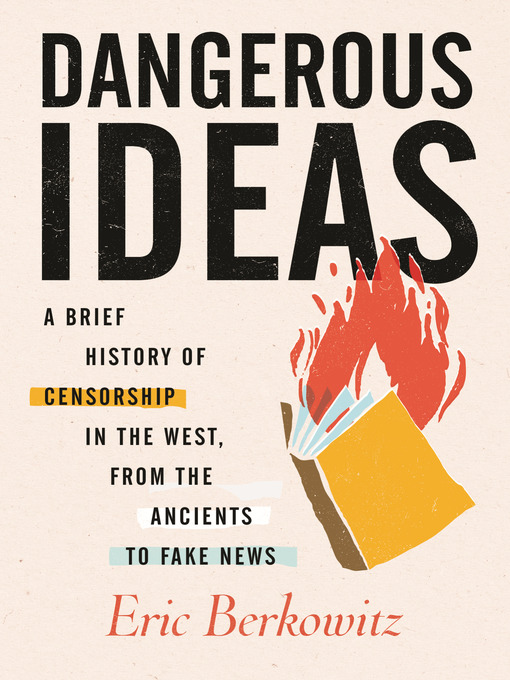- Let's Get Cooking!
- Celebrity Magazines
- News and Politics
- Just Added Magazines
- See all magazines collections
Dangerous Ideas
A Brief History of Censorship in the West, from the Ancients to Fake News
How restricting speech continuously shapes our culture, props up authorities, and maintains class and gender disparities
Through compelling narrative, historian Eric Berkowitz reveals how drastically censorship has shaped our modern society. More than just a history of censorship, Dangerous Ideas illuminates the power of restricting speech; how it has defined states, ideas, and culture; and (despite how each of us would like to believe otherwise) how it is something we all participate in.
This engaging cultural history of censorship and thought suppression throughout the ages takes readers from the first Chinese emperor’s wholesale elimination of books, to Henry VIII’s decree of death for anyone who “imagined” his demise, and on to the attack on Charlie Hebdo and the volatile politics surrounding censorship of social media.
Highlighting the base impulses driving many famous acts of suppression, Berkowitz demonstrates the fragility of power and how every individual can act as both the suppressor and the suppressed.
-
Creators
-
Publisher
-
Release date
May 4, 2021 -
Formats
-
Kindle Book
-
OverDrive Read
- ISBN: 9780807036259
-
EPUB ebook
- ISBN: 9780807036259
- File size: 4279 KB
-
-
Languages
- English
-
Reviews
-
Kirkus
March 15, 2021
A history of attacks on free speech. Lawyer and journalist Berkowitz offers a well-informed chronicle of censorship, from ancient times to the present, arguing persuasively that censorship does not work but instead makes ideas more effective by forbidding them. "Once transmitted," he writes, "an idea is not easily extinguished" despite fierce coercive power wielded to prevent, suppress, or punish expression. In the ancient world, some words, thought to have magical powers, were considered "so venomous" that they were banned. Athens allowed free speech in the agora but silenced thinkers such as Socrates, whose words were seen as polluting and his trial and death, a means of purification. Societies under stress--war, rebellion, class uprisings, religious dissent--often resort to censorship in the form of conflagrations: From Rome to Nazi Germany, many texts have gone up in flames. In the Middle Ages, the state quashed treasonous utterances by instituting public shaming; severed heads went on display as warnings. Beginning around 1450, the printing press, which circulated ideas quickly and widely, proved a bane to censors. Although, in 1670, Spinoza argued that free speech is a right in a free state, that principle has not been easily upheld. Soon after adopting the First Amendment, for example, the fragile new American nation passed a draconian sedition law. With examples of banned books such as Alice's Adventures in Wonderland and The Grapes of Wrath, Berkowitz underscores John Stuart Mill's contention that an idea that seems harmful one day might be beneficial on another. As much as he champions free expression, Berkowitz sharply indicts social media companies engaged in "surveillance capitalism," profiting by allowing racism, anti-Semitism, conspiracy theories, and disinformation to proliferate. Still, faced with this challenge, he reminds readers that "policing speech too aggressively risks exactly the kind of overbearing exercise of state power that spells the end of a free society." A timely contribution to an ongoing debate.COPYRIGHT(2021) Kirkus Reviews, ALL RIGHTS RESERVED.
-
Formats
- Kindle Book
- OverDrive Read
- EPUB ebook
subjects
Languages
- English
Loading
Why is availability limited?
×Availability can change throughout the month based on the library's budget. You can still place a hold on the title, and your hold will be automatically filled as soon as the title is available again.
The Kindle Book format for this title is not supported on:
×Read-along ebook
×The OverDrive Read format of this ebook has professional narration that plays while you read in your browser. Learn more here.

